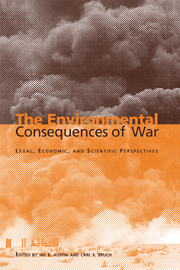Book contents
- Frontmatter
- Contents
- List of illustrations
- List of tables
- List of contributors
- Acknowledgements
- Foreword by Klaus Toepfer
- Introduction
- Part I General principles
- Part II The legal framework
- Introduction
- 2 The law of war and environmental damage
- 3 War and the environment: fault lines in the prescriptive landscape
- 4 The inadequacy of the existing legal approach to environmental protection in wartime
- 5 United States Navy development of operational-environmental doctrine
- 6 In furtherance of environmental guidelines for armed forces during peace and war
- Introduction
- 7 Peacetime environmental law as a basis of state responsibility for environmental damage caused by war
- 8 Environmental damages under the Law of the Sea Convention
- 9 The place of the environment in international tribunals
- 10 Civil liability for war-caused environmental damage: models from United States law
- Part III Assessing the impacts – scientific methods and issues
- Part IV Valuing the impacts – economic methods and issues
- Part V Prospects for the future
- Index
7 - Peacetime environmental law as a basis of state responsibility for environmental damage caused by war
Published online by Cambridge University Press: 04 August 2010
- Frontmatter
- Contents
- List of illustrations
- List of tables
- List of contributors
- Acknowledgements
- Foreword by Klaus Toepfer
- Introduction
- Part I General principles
- Part II The legal framework
- Introduction
- 2 The law of war and environmental damage
- 3 War and the environment: fault lines in the prescriptive landscape
- 4 The inadequacy of the existing legal approach to environmental protection in wartime
- 5 United States Navy development of operational-environmental doctrine
- 6 In furtherance of environmental guidelines for armed forces during peace and war
- Introduction
- 7 Peacetime environmental law as a basis of state responsibility for environmental damage caused by war
- 8 Environmental damages under the Law of the Sea Convention
- 9 The place of the environment in international tribunals
- 10 Civil liability for war-caused environmental damage: models from United States law
- Part III Assessing the impacts – scientific methods and issues
- Part IV Valuing the impacts – economic methods and issues
- Part V Prospects for the future
- Index
Summary
Perhaps the most destructive among man's many activities that threaten the environment is that of war.
Introduction
Environment has always been one of the main victims of war. The experiences of the 1990–91 Gulf War brought this fact into the public consciousness more than ever before. Plants and animals were destroyed and damaged, and air and water were polluted by the burning oil wells and oil slicks to such a degree that it seemed urgently necessary to examine the question of the extent to which belligerents are responsible under international law for damages caused by them to the environment.
State responsibility for environmental damage caused by war is commonly addressed in the traditional context of ius in bello and ius ad bellum. It is generally agreed that every violation of the laws of armed conflict that is attributable to a state entails the international responsibility of that state. Furthermore, a state incurs responsibility when it violates those rules of international law that prohibit recourse to force against another state, in particular Article 2(4) of the UN Charter. However, neither of these two bases of state responsibility is free from shortcomings, and even taken together they constitute only a rudimentary system of legal liability for environmental damage caused by war.
Without going into depth, it should be recalled that although there are several rules of the law of armed conflict that directly or indirectly protect the environment and whose violation will lead to international responsibility, these provisions include so many gaps that even the devastation of the 1990–91 Gulf War arguably was not covered by them all.
- Type
- Chapter
- Information
- The Environmental Consequences of WarLegal, Economic, and Scientific Perspectives, pp. 190 - 225Publisher: Cambridge University PressPrint publication year: 2000
- 8
- Cited by



